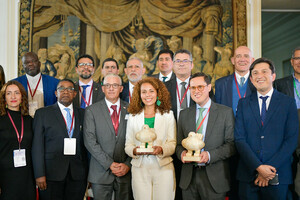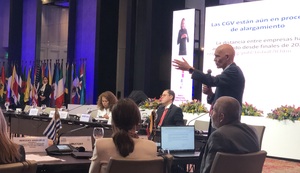Earlier this month, Carlo Pietrobelli (Professorial Fellow at UNU-MERIT and holder of our UNESCO Chair on Science, Technology and Innovation for Sustainable Development for Latin America) gave a keynote speech at the Fourth Meeting of the Conference on Science, Innovation and Information and Communications Technologies. The Conference is a subsidiary body of the United Nations Economic Commission for Latin America and the Caribbean (ECLAC); it serves as a permanent forum for policy and technical dialogue, convening high-level authorities who are responsible for science, technology and innovation policies in the LAC region. The purpose of these meetings is to coordinate action and knowledge-sharing, with the ultimate aim of improving the quality and effectiveness of policies in the relevant areas.
The two-day Fourth Meeting was organized by ECLAC in partnership with the Colombian government, bringing together government representatives from 23 Latin American countries, as well as over 300 participants from international organizations, the scientific community, academia, the private sector and civil society. Gustavo Petro, the current president of Colombia, opened the conference on 4 April 2024 at the Nariño Palace, Bogotá.

A group of delegates at the official opening of the conference at the Nariño Palace (Bogotá, Colombia), including Carlo Pietrobelli (third from right).
During the Meeting, the delegates discussed and agreed on areas of cooperation for the coming two years, particularly focusing on the four workstreams presented in the ECLAC document Science, technology and innovation for sustainable and inclusive productive development: Guidelines for 2024-2025. A biennial programme of regional and international cooperation activities was defined, in support of science, technology and innovation policies. The four workstreams are as follows:
- science, technology and innovation (STI) instruments for sustainable and inclusive productive development;
- governance of science, technology and innovation;
- science, technology and innovation with a territorial approach; and
- strategic sectoral and technological agendas.
Working groups for each of these approved lines of action are currently being established.
In his keynote speech at the event, UNU-MERIT’s Professor Pietrobelli argued that the current era of environmental and digital transitions makes Latin America’s availability of natural resources a blessing, provided that the necessary investments in innovation are ensured to fully exploit the potential. Moreover, he also stated that technology dissemination and adoption have a role to play in the highly heterogeneous context prevailing in Latin American countries, with extraordinary inequalities. Renewed efforts to increase capabilities in Latin American firms are of utmost importance, and the potential advantages offered by value chain integration and nearshoring will only be seized through active policies of value capture and innovation.
Pietrobelli’s remarks were picked up by a number of Spanish-language media outlets, which particularly focused on his comment that economic growth and productivity in Latin America and the Caribbean have been stagnant for 25 years – see for example the news piece ‘El crecimiento económico en América Latina lleva 25 años estancado, alerta experto‘.
For a more detailed overview of Pietrobelli’s keynote, the presentation slides can be viewed here [available in Spanish only].
The next UN event that UNU-MERIT’s UNESCO Chair is involved in will be UNCTAD’s Ad-hoc expert meeting on rethinking institutions of development in Geneva on 9-10 May 2024, to discuss the relationship between innovation policy and national quality infrastructures.
ANY COMMENTS?
NOTA BENE
The opinions expressed here do not necessarily reflect the views of UNU.
MEDIA CREDITS
Photos by ECLAC




